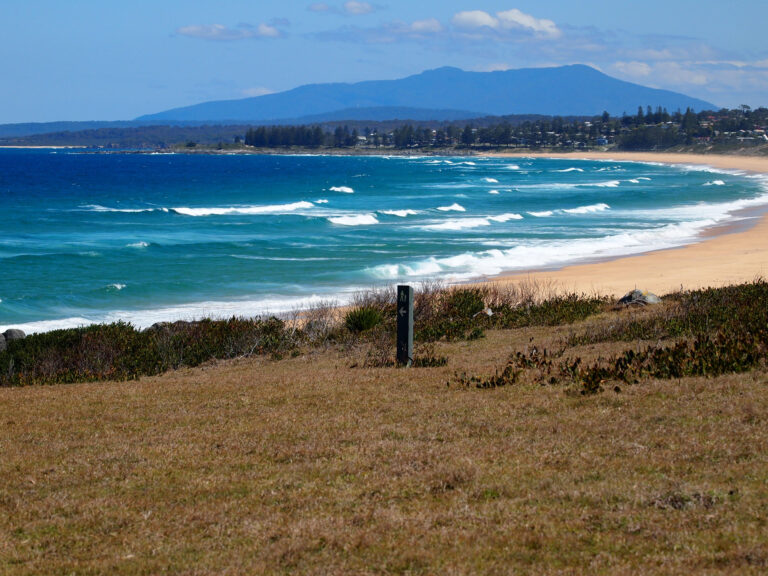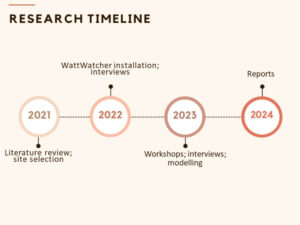
Project Overview
Duration: 3 years (2021 – 2024)
Budget: 3.125 million
Contact: Hedda Ransan-Cooper, Social Science Research Lead, ANU Battery Storage and Grid Integration Program.
Partners: Southcoast Health and Sustainability Alliance, Essential Energy and Zepben
Funded by: The Regional and Remote Communities Reliabillity Fund, Federal Govt Dept of Climate Change, Energy, the Environment and Water
What’s new?
Report: Exploring design challenges and opportunities for microgrids to improve resilience in the Eurobodalla.
About SµRF
A transdisciplinary microgrid project exploring ways to bolster the energy resilience of residents in the New South Wales south coast shire of Eurobodalla.
The devastating bushfires experienced during the Black Summer of 2019-2020 were all too real for the residents of the Eurobodalla Shire Council, an otherwise beautiful and largely mountainous coastal region encompassing Batemans Bay and surrounds.
With scientific experts predicting that extreme weather events such as bushfires will increase in frequency and intensity in the future, local communities, electricity providers and researchers are looking for ways to build more reliable, resilient and decarbonised power systems. The SµRF project is a community-led initiative that brings together diverse actors, looking at ways to achieve multiple benefits to stakeholders.
The project centres around the deployment of islandable microgrids. Microgrids act like mini electricity grids, capable of keeping local energy networks powered when they are cut off from the national system, such as during a bushfire event. As opposed to Stand Alone Power Systems (SAPS) that operate independently of the main electricity grid, microgrids are usually connected to the larger grid, but crucially they can also operate independently when needed, ensuring a local community has independent power supply if or when disaster strikes.
The Southcoast Microgrid (µ-grid) Reliability Feasibility (SµRF) project is funded by the Federal Government’s Regional and Remote Communities Reliability Fund. It is intended that this study will model use of renewable energy, including household, commercial and community solar, and small- and medium-scale batteries to provide power independent from the main grid.
The project will:
- Conduct a community-led design of future energy systems. This will involve:
- Exploring people’s aspirations and needs for energy resilience and the potential role of microgrids (ANU)
- Holding discussion forums and exploring microgrid scenarios with community members in 6 locations (Bodalla, Broulee, Central and Tilba Tilba, Congo, Mystery Bay and South Durras) (SHASA)
- Running workshops and microgrid scenario discussions in Nelligen and Tuross Head (ANU)
- Model the operation of 8 microgrids across the region and explore possible options for quantifying the value of resilience (ANU)
- Explore business models and regulatory innovations to improve feasibility (ANU and Essential Energy).
- Develop 8 business and implementation plans to understand feasibility of microgrids (for Bodalla, Broulee, Central and Tilba Tilba, Congo, Mystery Bay, South Durras, Nelligen and Tuross Head) (Essential Energy).
Key project outputs
- Does site selection need to be democratized? A case study of grid-tied microgrids in Australia. Energy Policy journal article
- Report: Community perspectives on microgrids and resilience in the Eurobodalla
- A methodology for selecting sites for resilience
- A summary of findings from the Eurobodalla wide interviews on initial responses to the feasibility of microgrids (December 2022)
- A report on methodology and examples for network graph vulnerability analysis (September 2022)
- Final reports (April 2024)
- Exploring design challenges and opportunities for microgrids to improve resilience in the Eurobodalla
- Methodology for co-designing microgrids with local stakeholders and results from co-design processes undertaken in the project
- Innovative governance models for managing microgrids/regulatory and policy barriers and opportunities
Supporting documents
- A methodology for electrical network vulnerability analysis Conceptual designs and costings for microgrids in the Eurobodalla – Zepben – Vulnerability Assessment Report
- Conceptual designs and costings for microgrids in the Eurobodalla – ITP – Concept Design Report
What does SµRF aim to do?
Our research aims to understand if and how microgrids could help achieve a resilient, reliable and equitable energy future for people in the Eurobodalla (a shire on the South coast of New South Wales). Grid-tied Microgrids are small/ geographically bounded electricity grids that can operate as part of the national/ regional electricity system as well as independently. This means they can provide power in situations when the rest of the system shuts down, for example in extreme weather events.
In the SµRF project, the ANU’s role is to identify the questions, issues and concerns that people have about microgrids in order to develop suitable operating models for eight selected sites that represent the diversity of the Eurobodalla.
While the research activity is an important part of the SµRF project, there are also outputs led by our project partners that use additional sources of information to produce other final project deliverables (business and implementation plans for 8 sites)
What research activities does the project undertake?
We are conducting research to understand both the community’s needs and the policy context in order to identify opportunities and barriers to grid-tied microgrids.
One focus is to understand people’s perspectives on these issues. To do this, we will conduct interviews and workshops with:
a) A broad section of community members across the Eurobodalla initially to understand the breadth of views on how micro-grids can bolster resilience. We will also conduct in-depth workshops in Tuross Head and Nelligen to better understand the specific issues that we may encounter when considering how to involve the community in designing a grid-tied microgrid. (2022)
b) Energy system and professionals in related fields such as utility, software, and insurance companies, and people involved in energy system policy to hear their views on microgrids and resilience. This will help us to better understand what policy or governance changes would be required to make grid-tied microgrids feasible moving forward. (2022-23)
We are also conducting an ongoing online survey across the Eurobodalla to uncover some general demographic information (e.g., gender, education level, ethnicity, income level) and their energy practices to understand the diversity of the population.
To help us with our in-depth understanding of possible micro-grid designs, we will also install 80 Energy monitoring devices in Tuross Head and Nelligen, called WattWatcher devices. These devices will monitor voltage and frequency of the electricity grid in homes and businesses as well as power consumption/generation for 12 and 24 months. Southcoast Health & Sustainability Alliance (SHASA) will support the ANU to install these devices, which will run for 12 months.
The data from WattWatcher devices will help us to understand how microgrids can best support the energy needs of the communities.
WattWatchers Flyer.
What results do we expect from our research?
We hope that our interviews, workshops and energy modelling can help us understand how communities on the South Coast (Eurobodalla Shire) view their energy future with or without microgrids.
In addition to researching people’s perceptions, our project also plans to develop tools and guidance for governments and the wider energy sector to consider what measures can be put in place to support microgrid projects in the best possible way with public support. Finally, our project will develop and understand the technical characteristics under which microgrids could be the most beneficial in the 8 sites. With sites selected through a consortium-wide process of quantitative and qualitative analysis and consultation with the Eurobodalla Shire Council, we hope that our learnings can be applied elsewhere in regional Australia.
Research timeline

What are the project partner’s roles in the research activity and the project?
SHASA and Essential Energy and Zepben are important project partners in helping us design and facilitate the research activity and the broader project outputs.
SHASA is not only assisting the research team with installing the WW devices, but also conducting workshops with six communities. You can read about this work here.
You can view presentation slides from the 2023 forums here:
Essential Energy is supporting research activity on the regulatory and technical issues related to grid-tied microgrids. They are also leading the work on developing 8 business and implementation sites.
Zepben is facilitating technical research by providing experience and software to clean and process the raw network and load data as well as developing a grid vulnerability assessment tool.
Research Workshops
Community specific documents
- Bodalla – Drawings of hypothetical microgrids
- Broulee – Drawings of hypothetical microgrids
- Congo – Drawings of hypothetical microgrids
- Mystery Bay – Drawings of hypothetical microgrids
- Nelligen – Drawings of hypothetical microgrids
- South Durras – Drawings of hypothetical microgrids
- Central Tilba and Tilba Tilba – Drawings of hypothetical microgrids
- Tuross Head – Drawings of hypothetical microgrids
Find out more
- The clean energy revolution isn’t just a techno-fix – it’s about capturing hearts and minds
- NSW South Coast communities selected for microgrid studies
- A framework for responsible project site selection – SµRF case study
- Southcoast microgrid project energised with 3.125M
- It’s time for Australia to start World War Zero
